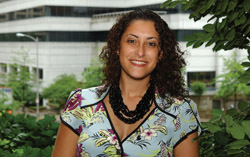Cultural Communicator
For Janine
C. Khayali, BBA ’00, MBA ’06,
one key to U.S. success internationally lies
in knowing what to say, how to say it, and how
to behave. That is: having competency in foreign
languages and cultures. Toward this goal, Khayali
is an important asset at the U.S. Air Force’s
new Office of Culture and Language Training
Policy.

|

Janine Khayali,
BBA ’00, MBA ’06, who speaks
at least four languages fluently, is part
of a U.S. Air Force effort to increase
cultural awareness and foreign language
competency within the U.S. military.
Julie Woodford
|
“Our ultimate goal is to create policy
that increases cultural and language competency
within the Air Force so that it becomes the
leader in these areas for the Department of
Defense,” Khayali says.
Why America needs such competency is apparent
if recent events in Iraq are considered.
“Because we don’t fully understand
the Iraqi culture, we’ve made mistakes,
and this has created problems. One example is
what occurred at the Abu Ghraib prison,”
Khayali explains. “Americans didn’t
fully understand how offensive these actions
were to the Iraqi people.
“No matter how noble your cause, if
you are making cultural mistakes that are deeply
offensive, you are not going to keep people
on your cause. As a result of such offensives
in Iraq, anti-American sentiment is growing—not
just among extreme Muslims, but also moderate-minded
Iraqis. This is not only my opinion, but it
is the prevalent opinion among Iraqis and the
Arab world.
“On the other hand, a little cultural
etiquette will go a long way in bringing people
back on our side. If a few Arab minds see cultural
sensitivity from Americans, that gets spread
around quickly. Marketing campaigns using media
like television and newspapers are not as effective
as good deeds that would influence the Iraqi
households through word of mouth. This is how
we should capture the hearts and minds of the
Iraqi people. That would change their perception
of America from an occupier to a liberator.”
Khayali’s qualifications come from her
heritage, training, and experience. She is the
daughter of a Swiss-American mother and an Iraqi-born
American father. Until Khayali was 10 years
old, she lived in Riyadh, Saudi Arabia, and
spent her summers in Spain. The family then
moved permanently to the United States.
When Khayali entered GW, she was fluent in
Arabic, Spanish, French, and English, and seeking
a degree in international business and finance.
After earning her bachelor’s degree in
2000, she joined management-consulting firm
BearingPoint. Recognizing her talents, the company
sent her to Baghdad to work on international
development of economic recovery and reform
projects after the defeat of Saddam Hussein.
In early 2004, she returned home and did consulting
work for PriceWaterhouseCoopers before jumping
back into the international arena in June 2004
with Management Systems International. This
job returned her to Iraq, where she monitored
and evaluated more than 20 U.S. Agency for International
Development projects to rebuild Iraq.
Back stateside in August 2004, Khayali again
worked for PriceWaterhouseCoopers while pursuing
a master’s in international business and
development at GW. She also got married—she
met her husband in Iraq; he was working in the
U.S. State Department’s Diplomatic Corps.
In March 2005, Khayali began working at the
Air Force Office of General Counsel, helping
create a center to teach multicultural negotiation
skills to future general officers. The development
was directed by negotiation expert Joseph McDade
(a Senior Executive Service officer).
“In August, Mr. McDade was chosen to
create the Office of Language and Culture Training
Policy. He brought me with him,” Khayali
says.
“It is going to take years to increase
culture and language competency, but this is
a priority and it’s happening because
of people like Brig. Gen. Robert Allardice [Air
Force director of Airman Development and Sustainment,
deputy chief of staff for Manpower and Personnel]
and Joe McDade,” she states. “While
everyone needs to have some language capability,
building up culture knowledge is the major focus.
“To do this, we are examining existing
initiatives to ensure we are all on the same
page. Then we will write the policy of where
we need to go. Next we’ll bring in subject-matter
experts—this is my specialty—to
meet our goal.
“We are also leveraging lessons learned
from nongovernmental organizations, like the
U.S. Institute for Peace, that have successfully
worked overseas. And we are looking for people
who are not considered ‘military’
to help us—like individuals who have worked
for the private sector.
“Our program is also trying to bridge
a relationship with GW, in that we want GW professors
and students with international backgrounds
to participate in specific projects. This would
include not just individuals from the Elliott
School of International Affairs, but from all
GW schools.”
Khayali guarantees the work will be rewarding.
“I’ve been able to work for a
group of very bright folks on the cutting edge
of thought when it comes to building cultural
knowledge,” she says. “As an Iraqi
American, I’ve brought the perspective
of the Arab mind and the Arab American mind.
They are taking my opinions into account, and
that has been the most energizing function of
what I’m doing.”
—Kathleen Kocks